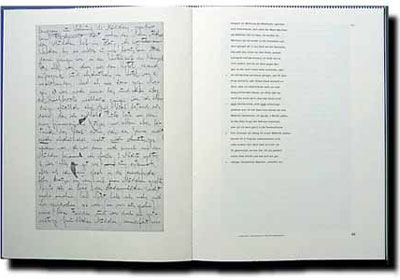|
||
 |
Die historisch-kritische Franz Kafka-Ausgabe (FKA)
Aufgeschlagene Doppelseite aus dem Band »Drei Briefe an Milena Jesenská« Die Franz Kafka-Ausgabe (FKA), im Januar 1995 mit einem Einleitungsband begründet und im Herbst 1997 mit der Faksimile-Edition von »Process« eröffnet, wird erstmals das gesamte überlieferte Korpus in authentischer Form bieten. In Orthographie, Zeichensetzung, Semantik und Syntax folgt die FKA strikt der Überlieferung. Sämtliche Handschriften und Typoskripte Franz Kafkas werden in Faksimiles wiedergegeben, wobei die Handschriften mit einer typographischen, zeichen-, zeilen- und seitengetreuen Umschrift versehen sind. Im Unterschied zu allen bisherigen Kafka-Ausgaben wird das gesamte überlieferte Werk dokumentiert, alle Texte werden den Originalen getreu mitgeteilt. Generalisierung bzw. Standardisierung von Textdifferenzen sind ebenso ausgeschlossen wie Modernisierungen oder unausgewiesene Korrekturen und Veränderungen. Die Bände der FKA erscheinen im Großformat, das die Reproduktion der von Kafka verwendeten Quarthefte im Originalformat erlaubt. Die Druckfilme der Faksimiles werden nach Möglichkeit unmittelbar von den Handschriften hergestellt und durch elektronischen Scanner detailgenau reproduziert. Mit der Faksimilierung verfolgt die FKA vornehmlich drei Ziele: — konservatorische Speicherung sämtlicher überlieferten Originalhandschriften und -typoskripte, von denen viele aufgrund der Beschreibstoffe (z. B. Bleistift) oder wegen des verwendeten Papiers in ihrem materialen Bestand gefährdet sind; — vollständige buchtechnische und elektronische Archivierung des gesamten Textkorpus; — ortsunabhängige Zugänglichkeit der Originale. In dem 1995 vorgelegten Einleitungsband hat Roland Reuß in einem Essay das Projekt FKA ausführlich begründet und die Verfahrensweise der FKA anhand der Faksimile-Edition des »Dom«-Kapitels aus »Process« und der Erzählung »Das Urteil« dargestellt (zur Begründung der FKA und zur bisherigen Kafka-Editorik vgl. auch Roland Reuß, »Genug Achtung vor der Schrift«?, in: TEXT 1 (1995), 107-126). Der ebenfalls 1995 erschienene Faksimile-Band »Drei Briefe an Milena Jesenská vom Sommer 1920« hat die geplante Brief-Edition zur Diskussion gestellt. Die FKA ist auf etwa 25 Bände angelegt. Der Treue zur Überlieferung entsprechend wird die in früheren Kafka-Ausgaben gängige, aber irreführende Aufteilung in »Nachgelassene Schriften« und »Tagebücher« aufgegeben. Exemplarisch für die getreue Wiedergabe des überlieferten Materials ist die im Herbst 1997 erschienene Edition des »Process«-Entwurfs. Die Episoden der einzelnen Kapitel, die von Kafka noch nicht in eine endgültige Reihenfolge gebracht wurden, werden je in Einzelheften (insgesamt 16 Hefte), gesammelt im Schuber, vorgelegt. Die beigegebenen »Franz Kafka-Hefte 1« enthalten einen detaillierten Editionsbericht, alle Dokumente zur Entstehungsgeschichte, eine forschungskritische Darstellung der bisherigen »Process«-Philologie sowie die Beschreibung der überlieferten Textträger. Weitere Bände der FKA:
Historical-Critical
Edition of the Works of Franz Kafka The FKA (Franz Kafka Ausgabe), prefaced in January 1995 by an introductory volume and begun in autumn 1997 with a facsimile edition of »Process«, will present the first ever complete corpus of his works in authentic form. The FKA adheres to the surviving texts in spelling, punctuation, semantics and syntax. All of Franz Kafka's manuscripts and typescripts are reproduced in facsimile; the manuscripts are provided with a typographic transcription completely faithful to the original. Unlike other Kafka editions so far, the FKA will document all the surviving works; all the texts will be presented in a form that is faithful to the original. There will be absolutely no generalisation or standardisation of differences in the text, and no modernisations or covert corrections or alterations. The individual volumes of the FKA will be printed in large format, to allow the reproduction of the original quarto format of the notebooks used by Kafka. Wherever possible, the films for the facsimiles will be produced directly from the manuscripts and reproduced exactly using electronic scanners. This facsimile procedure for the FKA pursues three main objectives: — the conservation of all the surviving original manuscripts and typescripts, many of which are endangered either because of the writing utensils used (for example, lead pencil) or the type of paper written on; — the archiving of the complete body of texts in book and electronic form; — easy accessibility to the originals, irrespective of their location. In the introductory volume of 1995, »Einleitung«, Roland Reuß’s essay provided detailed reasons for the FKA project and outlined the FKA mode of procedure with reference to the facsimile edition of the »Dom« chapter from »Process« and the short story »Das Urteil« (for a justification of the FKA and information on the editorial work to date cf. Roland Reuß, »Genug Achtung vor der Schrift«? in TEXT 1 [1995], pp. 107-126) The facsimile volume »Drei Briefe an Milena Jesenská vom Sommer 1920«, also published in 1995, put the planned edition of the correspondence up for discussion. The FKA is scheduled to comprise 15 volumes. Out of fidelity to the surviving originals, no distinction will be made between »Nachgelassene Schriften« and »Tagebücher«, a common though confusing division made in former Kafka editions. An exemplary sample of the faithful reproduction of the original material is the edition of the »Process« published in autumn 1997. The episodes of the individual chapters, which Kafka never put in a final order, are presented in individual booklets (a total of 16) collected in a slip-case. The enclosed »Franz Kafka-Hefte 1« contain a detailed report on the edition, all documents relevant to its genesis, a critical presentation of scholarly research to date on the »Process«, and a description of the text media that have survived. Further volumes of the FKA: |
for an english version please click here
|
Copyright by Institut für
Textkritik, Heidelberg © 2005 |
||

|
||



